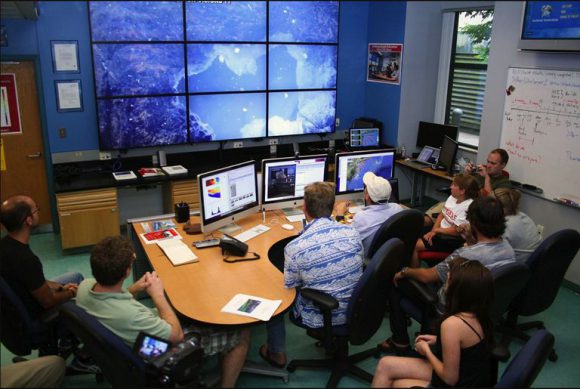
Rutgers undergraduate students join faculty at the RU COOL lab at the Department of Marine and Coastal Sciences.
By Samuel Ludescher (SAS’18).
The Rutgers University Center for Ocean Observing Leadership, also known as RU COOL, was commended in Senate Resolution SCR-144 by the New Jersey Senate Environment and Energy Committee on March 13 for its contributions to ocean research, data collection, technology and forecasting.
In part, SCR-144 recognized RU COOL’s “leadership role in developing the Integrated Ocean Observing System (IOOS), which gathers data on key coastal, ocean, and Great Lakes variables and ensures timely and sustained dissemination of that data to support economic development, public safety, and resource management.”

Dean Richard Ludescher (closest) describes some amenities of the RU COOL lab before Sen. Bob Smith D-17 (far left) and members of the New Jersey Senate Environment and Energy Committee.
“The COOL lab acts as Houston Mission Control for ocean observing at Rutgers, managing a fleet of gliders, underwater robots, that circle the globe,” said Richard Ludescher, dean of academic programs at the School of Environmental and Biological Sciences, who represented Rutgers and RU COOL before the Senate Environment and Energy Committee to thank NJ Senate President Stephen Sweeney and Committee Chair Sen. Bob Smith D-17 for their support of RU COOL.
In addition to Senate Committee Chair Smith, Vice-chair Linda Greenstein D-14, Sen. Samuel Thompson R-12 and Sen. Richard Codey D-27 were present for the commendation.
RU COOL was established in 1992 by the Institute of Marine and Coastal Sciences (IMCS), now the Department of Marine and Coastal Sciences (DMCS), as part of the National Oceanographic Partnership Program for the purpose of “understanding the bio-physical processes of the coastal oceans and their impacts on human society,” said an excerpt of the resolution.
The lab has garnered more than $80 million in federal funding over the last decade and now “utilizes a state-of-the-art facility and satellite, high frequency radar, and underwater glider technology to improve how water quality problems are investigated in the State, helping to maintain healthy New Jersey shores.” RU COOL plays a major role in the Mid-Atlantic Coastal Ocean Observing Regional Association, providing the U.S. Coast Guard with data and forecasts of surface currents to help with their search and rescue operations. Also, the lab has partnered with over 25 companies to develop new research technologies, such as ocean sensors, sampling platforms and communication networks.
RU COOL may most famously be known for the launch of ocean glider RU27, the first underwater robot to cross the Atlantic Ocean. The glider was launched from New Jersey on April 27, 2009, and landed in Spain on December 9, 2009. Ludescher was an executive producer for the documentary film, Atlantic Crossing, which followed RU27 and RU COOL’s groundbreaking journey.
The lab isn’t exclusive to marine and coastal scientist students either. The general public are welcome to tour RU COOL with the help of an undergraduate student. “A wall of computer monitors allows visitors to follow the activities of gliders anywhere they are in the world’s oceans,” said Ludescher.

